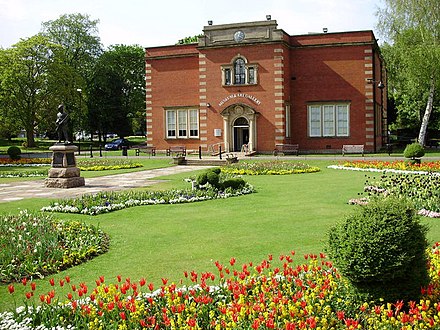Nuneaton - town in Warwickshire, England
Nuneaton is the largest town in Warwickshire, with a population in 2011 of 86,552. It was heavily bombed in the Second World War and rebuilt in typically unsympathetic post-war style. Its best-known landmark is Mount Judd (aka the "Nuneaton Nipple"), a 518-foot spoil heap.
Understand

"Eaton" means a settlement next to water, and the "nun" was added when a Benedictine nunnery was founded in the 12th century. In the 17th century Nuneaton manufactured silk ribbons, and in the 19th century it became a coal-mining town. That era was captured by George Eliot (penname of Mary Ann Evans, 1819 – 1880); born locally, her novels depict rural provincial life as it becomes challenged by the march of industry, and they refer to the town as "Milby".
Get in
Nuneaton is east of Birmingham.
By car
The town is close to the M6, M1 and M42 motorways, so is easy to reach by road from anywhere in England.
By train
Nuneaton Station 📍 is an important railway junction and is served by trains on the UK West Coast mainline.
Get around
See
- Nuneaton Museum and Art Gallery, Coton Road, Riversley Park, Nuneaton, CV11 5TU, 52.52020°, -1.46606°, +44-2476-350-720, museums@nuneatonandbedworth.gov.uk. Permanent displays related to George Eliot and local history. Temporary and touring exhibitions. 2016-05-25
Do
- The Abbey Theatre, Pool Bank St, CV11 5DB, 52.52294°, -1.47510°. Theatre seating 248, opened in 1969, mainly run by volunteers. 2016-05-25
- Pingles Leisure Centre, Avenue Rd, CV11 4LX, 52.5154°, -1.4627°. Includes a gym and swimming baths. 2016-05-25
Buy
- Ropewalk Shopping Centre, Chapel St, CV11 5TZ, 52.5218°, -1.4695°, +44 2476 641714, ropewalk@key-lime.co.uk. M–S 7AM–7PM Su 9:30AM–5:30PM. Multi-storey shopping centre that sells clothing, jewellery, food and electronics. 2017-07-11.
- Buy market produce at the market in the town centre.
Eat
- Crossed Khukris Gurkha Restaurant, 115 Abbey St, CV11 5BX, 52.523826°, -1.470243°, +44 24 7634 4488. 2017-10-30
Drink
- The Felix Holt, 3 Stratford St, CV11 5BS, 52.52297°, -1.46922°, +44 24 7634 7785. Wetherspoon's pub with meals named after a character created by George Eliot. 2017-04-18
- The Silk Mill Nuneaton, 42 Newdegate St, Nuneaton CV11 4EU, +44 24 7632 0589. Friendly pub that shows sports, serves meals unlike some pubs in Nuneaton. For those who don't drink, there's coffee. 2021-07-31
Sleep
- Holiday Inn Express Nuneaton, The Bermuda Park, St Davids Way, CV10 7SD, 52.49694°, -1.47674°, +44 24 7635 7370. 2017-04-18
- La Tavola Calda Hotel, 68 Midland Rd, Nuneaton CV11 5DY, +44 20 8089 8579. Cheap hotel in quite a central location, next to the quarry. Nice cooked breakfast and does Italian food in evenings. 2021-07-31
Connect
Go next
Warwickshire
2nd-order administrative division
England
Primary administrative division